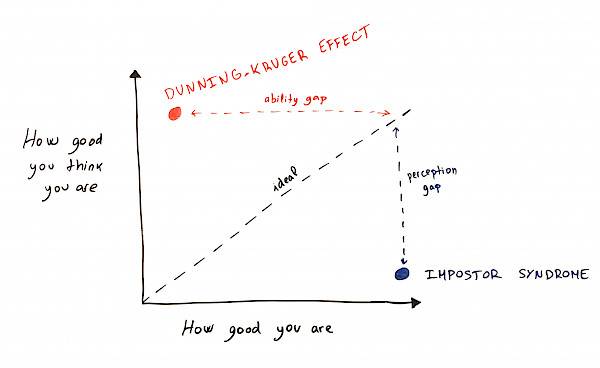Episode transcript The transcript is generated automatically by Podscribe, Sonix, Otter and other electronic transcription services.
Ricardo (4s): Hello everyone. Welcome to the five minutes BM podcast. Today, I will wrap up this series around Cognitive Bias. If we go back to the first episode, I spoke clearly what a Cognitive Bias is. I said about the decisions that take in consideration, irrational facts, irrational behavior that drive us to the wrong or por decisions. Last week, I challenged myself to try to explain in a podcast, numbers around the birthday paradox. And I sat that if you have a group of 23, people, the chances that two of them match the same birthday in this room is more than 50%.
Ricardo (49s): Incredible. We never think about it. And today I want to wrap up this series talking about two Cognitive Bias that are critically important for us. while driving our work. The first one is the Dunning Kruger Effect. What is it a Dunning Kroger Effect? Is when someone due to the lack of self-awareness, overestimates, his or her competence two, makes a decision. So when you don't have knowledge, but you truly believe you have and based on your ego, you just decide, but you decide with no competence to decide on that topic.
Ricardo (1m 35s): So this is very common. And let me tell you most of us with true life, we have moments where we are, you know, victims of the Dunning Kruger, of course, some people, they have a much more long Effect of the Dunning Kruger or there's a much lower Effect, but let's suppose that you become a boss quite fast. I would say quite young. Okay. Just for the Datical propers. And then sometimes you start thinking that, Oh God, I'm so good. I'm so good. I became CEO. So young. I became so that you start; your ego starts to Dominate. I know, I know everything I know about everything I can decide on anything.
Ricardo (2m 20s): And then sometimes you feel over competent and you make poor decisions. This is the Dunning Kroger Effect because this name takes Dunning and Kruger, they where the two researchers that studied this topic. Now, on the other side, the imposter syndrome, the imposter syndrome, the person that is a victim of the Syndrome it's on the opposite side is someone that has full competence to decide but does not recognize that the person always thinks he or she is a Froud.
Ricardo (3m 0s): They doubt their own competence and they do not want to decide. And sadly, the first study around that was in 1978 exactly about women in the workplace because some women at that time were very competent, but they did not recognize that competence. So they deferred the decisions. So we are talking about two absolutely opposite situations. Dunning Kruger, you don't know but you believe, you know, imposter syndrome, you know, but you don't believe, you think you are a Froud. For example, you just got promoted almost all of us, almost all normal people.
Ricardo (3m 44s): When you got promoted that feeling when you go to bed and sleep, you say, Oh my God, do I deserve that? You know, this is a normal thing, but when this feeling extends forever, then you have a problem, right? Then you were becoming a victim, of this Syndrome So let me explain why I dedicated one Podcast one episode just for these two because this is the most, single reason, the most relevant reason for things fail. When you have someone with competence that does not want to take the decision and someone with no competence that is more than willing to take because we will drive the bus to the absolutely wrong road.
Ricardo (4m 34s): So my end message to all of you. Remember one thing who should decide is, you know, the person who knows about the topic, competence-based decision making. This is why sometimes we see CEOs, we see government leaders messing up on decisions because they truly believe that they know all about the economy. They know all about the climate. And then they make dumb decisions because they have so much power and they say, Oh, I became president or I became CEO. So I know where everything, and then they fail. So what is important, even if you have the empowerment to decide, you should be a little bit more humble and give some of, this confidence for those who dominate technically.
Ricardo (5m 27s): And if they think that they are not empowered to decide, they should be empowered. So if you have a graphic, okay, on the Y you put recognition and on the X, you put competence, the Dunning Kroger victims. They are all always with high. Ys, a low X means someone with a lot of recognition about his or her own competence, but no real competence and impostor syndrome is the opposite someone with a very strong X and almost zero Y, means The person that has a lot of competence, but no recognition on that.
Ricardo (6m 8s): So what we need to do is to bring two X and Y in more equal terms, if you don't have competence, you don't recognize if you have competence, then you recognize If you can solve this problem, trust me, 50% of your delivery problems will be sorted out. Magically. Of course, because you are handling with people. This is not very easy, but at least now you are more aware of all this Cognitive Bias. And maybe it's a good time for you to share with your colleagues and self-awareness is absolutely everything. If you want to get the work done, I hope you enjoyed this series.
Ricardo (6m 49s): See you next week with another five minutes PM. Podcast.

